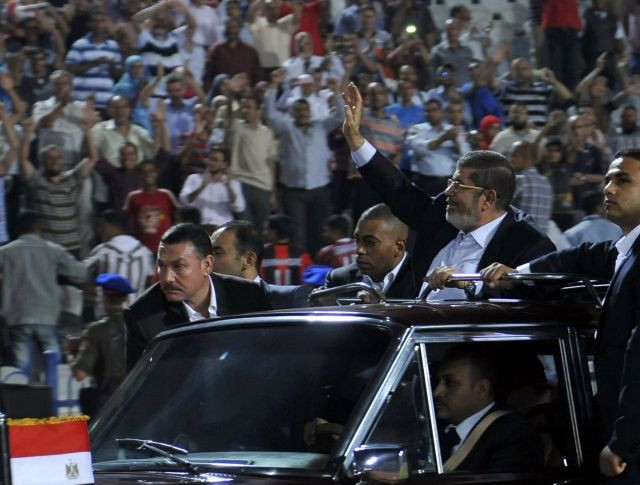100 Days In Office: Egypt’s Morsi Says 70 Percent Of Promises Fulfilled

Egyptian President Mohammed Morsi on Saturday defended his showing in the first 100 days in office and listed his government’s accomplishments to a cheering crowd of mainly Muslim Brotherhood supporters at a gathering in Cairo.
The president addressed tens of thousands of Egyptians at the Cairo stadium at a ceremony commemorating the anniversary of Egypt’s successful crossing of the Seuz Canal in its October 1973 war against Israel.
"This nation, these people, this army, the establishment, the president, the children of Egypt — we are all now moving toward one goal: a new Egypt," he was quoted saying by the Associated Press.
Morsi took charge in June ending the army council rule of 16 months that followed Hosni Mubarak’s ouster in 2011.
"What has been achieved is not enough of course, but what has been achieved by professional standards is about 70 percent of what we targeted during those 100 days,” Reuters quoted Morsi as saying while referring to a 100-day plan of his government that focused on a host of domestic issues.
“We were in a phase where there was a lot of corruption. We want this corruption to stop," Morsi said vowing to stop corruption.
Morsi appeared relaxed and responded to his supporters’ cheerful welcome by pumping both fists in air and waving to the crowd.
Among the criticism for the nation's first democratically elected president was that he sought monopoly over decision-making and that he failed to deliver on any of his key campaign promises.
Though Morsi did manage to make an impact from a global perspective, domestic issues encompassing fuel shortage, food subsidy, security, waste disposal and traffic congestion have remained his headaches.
Morsi dismissed criticism that he had placed foreign policy ahead of domestic affairs, saying that his visits to Addis Abbaba, Beijing, and New York among other destinations were to boost the economy.
"We conducted nine trips in 11 days. They brought the economy around $10 billion in the form of direct support as well as investment projects during a brief period," Morsi was quoted saying by Reuters.
The Egyptian government in August sought a $4.8-billion loan from the International Monetary Fund in a bid to help boost the country's struggling economy to recover from a political turmoil since last year's uprising.
The nation's earlier discussions with the IMF for a loan, during the rule of military-led Supreme Council, were unsuccessful partly due to the continued violence ahead of the parliamentary elections.
Egypt's net international reserves fell to $16.4 billion by the end of January, from $35.6 billion at the beginning of 2011, the New York Times reported citing data from the Central Bank of Egypt.
In the 12 months to June 2012, the government borrowed about $12 billion, which amounts to 4.5 percent of GDP, from the central bank, in a desperate measure to finance its budget deficit, Reuters reported.
© Copyright IBTimes 2025. All rights reserved.






















